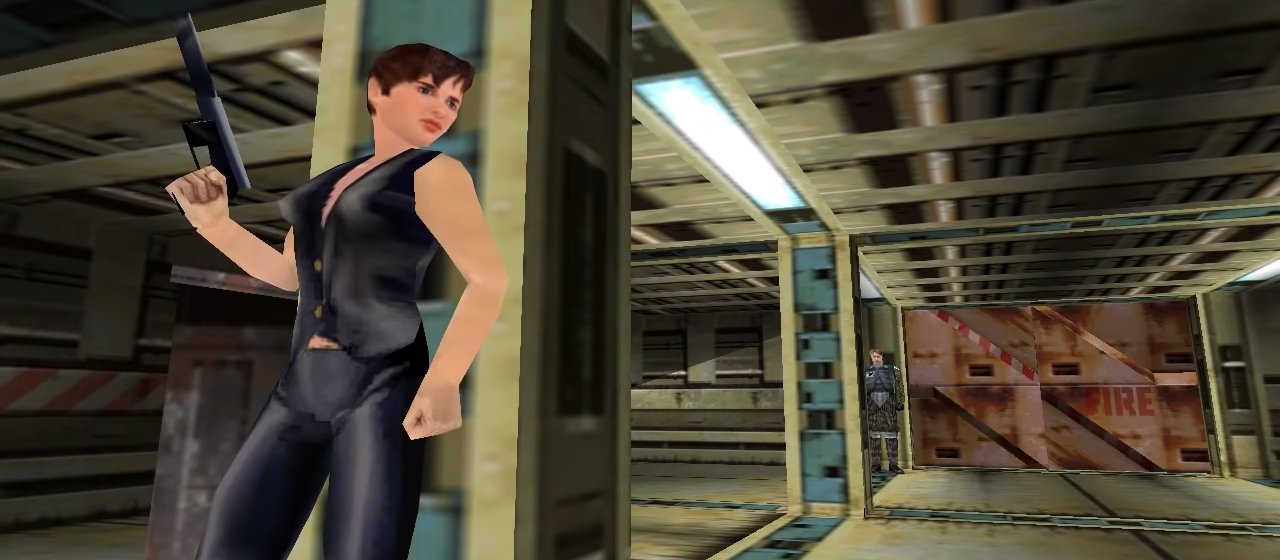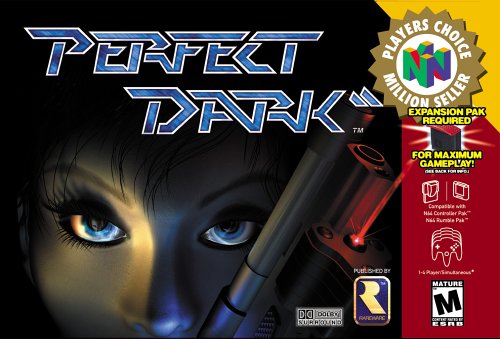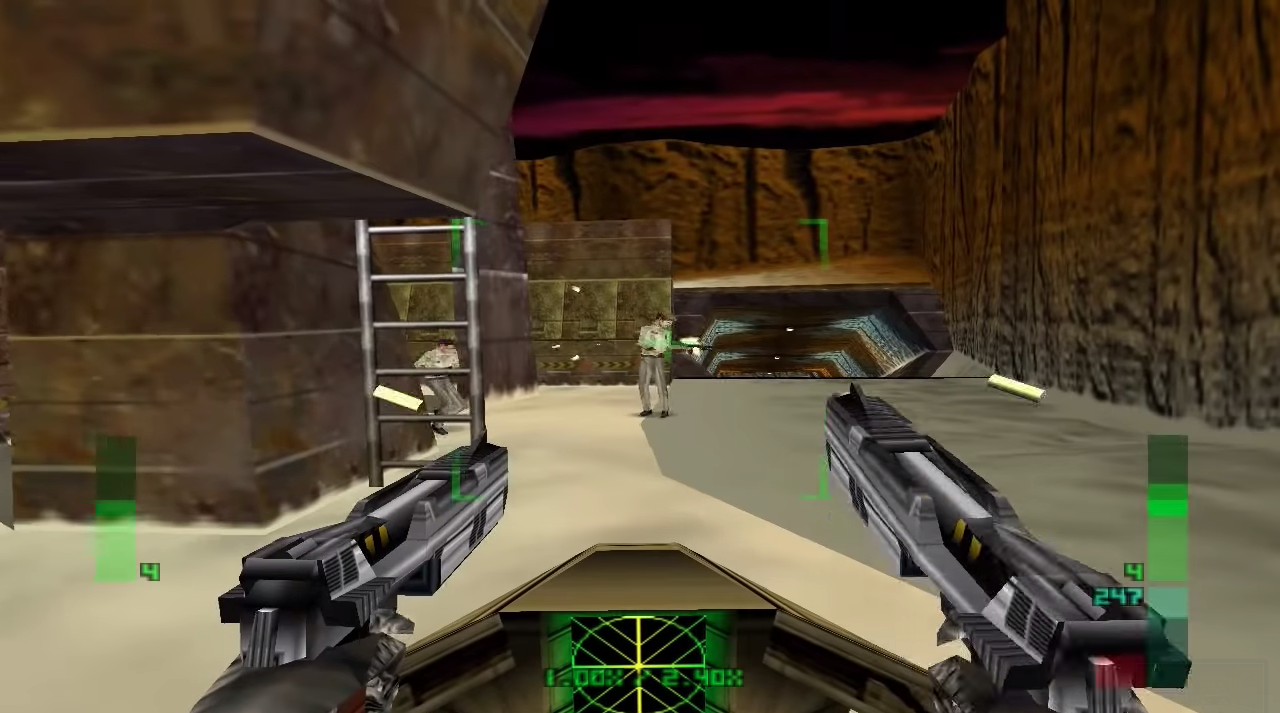

“I have a headache, and with a head this big, that’s no joke.”
After Rare released GoldenEye 007—a game that completely redefined what a console-based first-person shooter could be and proved that movie tie-in games did not have to suck as a rule—they hunkered down for a few years,1 refined the gameplay, and came back with a spiritual successor, Perfect Dark. Sans the Bond license, the developers at Rare were now able to channel their creative juices as they saw fit, which resulted in a wonderful slice of schlocky cyberpunk pie. Take away the English spy and insert crazy futuristic weapons, zany gadgets, and an alien sidekick. Joanna Dark doesn’t have quite the mass appeal of James Bond—let’s cut ‘em some slack, this was a completely new intellectual property—but it’s hard to argue that this game doesn’t slightly one-up its successor in almost every area. In fact, the only legitimate complaints that seemed to come its way upon release were that it was too ambitious for the N64 hardware that it had to run on, even with the Expansion Pak.
Inspired by the dystopian science fiction worlds of films like Blade Runner and Ghost in the Shell, development commenced around the idea of a James Bond spy thriller with a futuristic sheen; a trigger-happy romp through visually distinct locales, distinguished by its imaginative arsenal and strong female lead. Other influences include Thomas Pynchon’s mesmerizing conspiracy novel The Crying of Lot 49 and the then-recently released Metal Gear Solid.

You play as Joanna Dark, a talented spy for the Carrington Institute, tasked with infiltrating an organization known as dataDyne when a signal is received from an inside source who wishes to defect. When you finally fight your way through legions of bad dudes to rescue the guy, you find out he is an artificial intelligence lodged in a flying laptop. At first, I was taken aback, unsure if I was supposed to swallow such a cheese ball with a straight face or not, but soon I realized that over-the-top was the M.O. for this game.
There are two alien races, the Maians and the Skedar, who are allied with the Carrington Institute and dataDyne, respectively. As the outrageous plot unfolds, your mission will take you from Area 51 to Air Force One. You’ll assassinate a clone of the president and work closely with a cartoonish grey alien named Elvis. Eventually, you find yourself in a showdown with the Skedar leader on the homeworld of the alien species. A sci-fi James Bond, indeed, with a plot outlandish enough to remain in the foreground and sufficient screwball elements to spice up the gameplay and make it different from what came before.2

It is very similar to GoldenEye though. The basic mission structure, objectives, level layout, and weapon and item pickups remain mostly the same. The three different difficulties change the levels considerably, adding more objectives while beefing up your enemies and increasing their weapon accuracy. It seems like the enemy AI are a little bit smarter than in GoldenEye, but they’re still fairly unsophisticated. If one catches a glimpse of you, for even a second, they are alerted to your presence, often running for an alarm to call for reinforcements. But if they can’t see you, they remain completely oblivious to you; so you can walk up behind them and whack them on the noggin without trying to be stealthy about it at all. It has the appearance of stealth, but it pales next to Hitman: Codename 47 (released the same year) or Tom Clancy’s Splinter Cell (2002). I must even admit that Metal Gear Solid is probably better in this regard, despite my general dislike of it. Elsewhere you can disarm opponents via hand-to-hand combat (and they can do the same to you) and generally Rambo through levels by using an auto-lock feature that helps overcome the awkward controls,3 and a good bit of fun is to be had wandering around blasting through the enemies with an increasingly outlandish arsenal.

Despite its many positive attributes, Perfect Dark gets hit with a double whammy—it simply could not have as massive of a cultural impact as GoldenEye, and considered as a first-person shooter, it was blown out of the water a year after its release by Halo: Combat Evolved. Many people found Rare’s tweaks on the earlier formula and the new sci-fi gloss to be enough to justify countless hours playing through the various difficulty levels, exploring the surprisingly expansive multiplayer modes, and unlocking all of the cheat codes. But even though it is fun to play through and competently made, it feels like a game several years older than it is. Considering its contemporaries—Half-Life, Deus Ex, Quake II, along with others already mentioned—it almost feels like a throwback in comparison. Playing it today it most refreshing aspect is the general lack of coddling that is applied to its self-contained but non-linear levels, which allow for some trial-and-error exploration and tactical experimentation.
If you haven’t played Perfect Dark, I think it is worth running through, even on the easiest difficulty—to see Rare at the top of their game, when they ruled the N64 roost; to hear the memorable soundtrack in context; to see how goofy and fun game stories were allowed to be in those days (or not, it got some flak for its inane narrative); to immerse yourself in what was a fine shooter for its time.
Rare would make several more solid games for the Nintendo 64 (Banjo-Tooie, Conker’s Bad Fury Day) and Game Boy Advance before switching teams and releasing two of the launch titles for the Xbox 360, including Perfect Dark Zero, a prequel to the original.
1. By “hunkered down for a few years” I mean they released four additional N64 games, several classics among them, including Banjo Kazooie and Donkey Kong 64.
2. I find it interesting how expectations can differ so drastically between mediums. If a film were as stylistically goofy as Perfect Dark, I would probably find it difficult to view it as anything other than camp. Indeed, it feels somewhat akin to Buckaroo Banzai. But somehow Perfect Dark, composed of a mish-mash of sci-fi tropes and crazy ideas, is easy to take seriously as a game. Why is that? My best guess is that camp cinema does not do anything new, except potentially in the realms of absurdist strains of comedy, but games like PD, while low-brow in some areas, can still make innovations in gameplay or simply be well-made no matter what aesthetics and tone are laid over top of the engine.
3. I emulated this go-around instead of breaking out the N64, so it wasn’t that bad because I could map the controls to dual joysticks. I don’t know how people got used to the awkward default control setup with movement dictated by the face buttons on the N64, but before consoles had two joysticks I guess people just learned to live with it. In any case, if I ever upgrade to an Xbox One, I plan to track down Rare Replay, which contains a 2010 built-from-the-ground-up remaster of the game.
Sources:
Carle, Chris. “Perfect Dark Guide – Story”. IGN. 22 May 2009. (Archived).